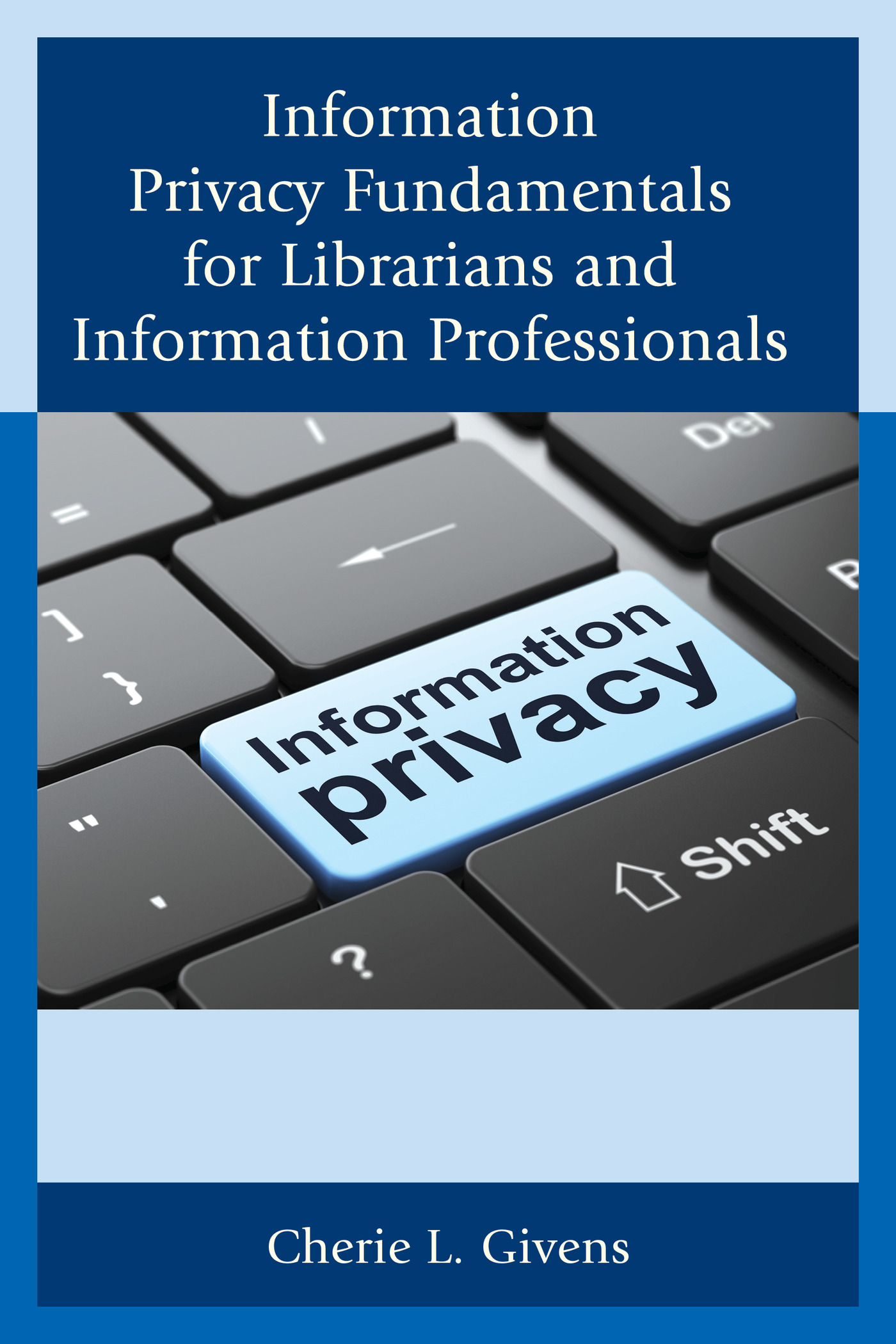Information Privacy Fundamentals for
Librarians and Information
Professionals
Information Privacy Fundamentals for
Librarians and Information
Professionals
Cherie L. Givens
ROWMAN & LITTLEFIELD
Lanham Boulder New York London
Published by Rowman & Littlefield
A wholly owned subsidiary of The Rowman & Littlefield Publishing Group, Inc.
4501 Forbes Boulevard, Suite 200, Lanham, Maryland 20706
www.rowman.com
Unit A, Whitacre Mews, 26-34 Stannery Street, London SE11 4AB, United Kingdom
Copyright 2015 by Cherie L. Givens
All rights reserved. No part of this book may be reproduced in any form or by any electronic or mechanical means, including information storage and retrieval systems, without written permission from the publisher, except by a reviewer who may quote passages in a review.
British Library Cataloguing in Publication Information Available
Library of Congress Cataloging-in-Publication Data
Givens, Cherie L., 1969
Information privacy fundamentals for librarians and information professionals / Cherie L. Givens.
p. cm.
Includes bibliographical references and index.
ISBN 978-1-4422-4211-1 (cloth : alk. paper) ISBN 978-1-4422-2881-8 (pbk. : alk. paper) ISBN 978-1-4422-2882-5 (ebook)
1. RecordsAccess controlUnited States. 2. Data protectionLaw and legislationUnited States. 3. Computer securityLaw and legislationUnited States. 4. Privacy, Right ofUnited States. 5. Library legislationUnited States. 6. Information servicesLaw and legislationUnited States. I. Title.
KF1263.C65G58 2015
025.5dc23
2014023397
 TM The paper used in this publication meets the minimum requirements of American National Standard for Information Sciences Permanence of Paper for Printed Library Materials, ANSI/NISO Z39.48-1992.
TM The paper used in this publication meets the minimum requirements of American National Standard for Information Sciences Permanence of Paper for Printed Library Materials, ANSI/NISO Z39.48-1992.
Printed in the United States of America
This book is intended for informational purposes only. It should not be used as legal advice. Readers should consult an attorney for advice regarding specific legal questions and the laws that apply to their unique work environments. Privacy professionals should be consulted by those seeking assistance creating privacy policies, programs, and training as well as performing assessments and audits.
Acknowledgments
This book would not have been possible without the encouragement, friendship, and assistance of many people. Special thanks are owed to Hank for his enduring support of this endeavor. I thank Eric Moskowitz and Bertha Ochoa for their assistance in editing and preparing this manuscript.
I owe special thanks to the International Association of Privacy Professionals and many of the members of this wonderful group for inspiring me to develop my expertise in the field of information privacy. I appreciate the supportive environment and many learning opportunities that have been made available to me through Privacy Summits, KnowledgeNets, and thoughtful conversations.
I am grateful to Mary Alice Baish, Superintendent of Documents, U.S. Government Printing Office, for providing me with the opportunity to develop privacy policies and procedures, serve as privacy point of contact, and address privacy matters for the Office of the Superintendent of Documents and the Library Services and Content Management business unit. My work at the U.S. Government Printing Office inspired this book.
Special thanks are owed to my editor, Charles Harmon, for suggesting that I write a book about information privacy, giving me the opportunity to do so, and shepherding me along the way. I thank everyone at Rowman & Littlefield who helped to bring this book to press.
Preface
I wrote this book to help educate librarians and information science professionals about the fundamentals of information privacy. When I worked in library services and content management for the federal government, I had the opportunity to see firsthand that information privacy issues occur in the workplace and that those working in library and information positions can find themselves on the front lines, needing to be able to identify and address these issues. Information Privacy Fundamentals for Librarians and Information Professionals is designed to provide an introduction to information privacy laws and practices while incorporating practical privacy information for those who will need to identify and address privacy issues in the workplace.
As information science programs diversify, they provide a broader range of career paths and training for students who will work in increasingly diverse work environments. Many students will find employment outside of the traditional library and school environments. They may work in positions in government, businesses, and health care environments. It is crucial that those in the information professions understand what laws and regulations govern the handling of personally identifiable information (PII) in their work environments and be able to identify information privacy issues and address them.
It is my firm belief that if those of us working in the information professions do not fully embrace information privacy, others will decide our privacy policies and practices. We manage information. Personal data, also known as PII, is a form of information. Becoming proficient in applying the laws, regulations, and best practices for managing personal data is a necessary part of the educational process.
Information privacy is a growing and changing field. No one book can teach you everything you need to know. This book is designed to provide readers with a foundation that reflects current law and practice on which to build their privacy knowledge. Laws change, practices change, and professionals must continue to educate themselves to keep abreast of those changes. Everyone needs to know how to protect personal data in their professional and personal lives.
It is presumed that this book will be read cover to cover or referred to by chapter for quick reviews. Read it completely for an understanding of the fundamentals of information privacy from a library and information science perspective. Use this book as a reference and consult relevant chapters for specific areas of interest. I have included references where needed to aid those who seek to use this book as a reference only. Some redundancy was necessary to allow for the use of this book as a chapter- and topic-specific reference.
Chapter 1
Introduction to Information Privacy
Issues surrounding information privacy have gained prominence in recent years due to changes in technology and the rise of data mining. The increasing ability and efforts to gather data about individualsincluding information about their health, finances, and online activitieshave increased privacy concerns. Continuing reports of data breaches, secret data collections, deceptive privacy policies, and large-scale spying and data collection have made us a country weary of the efforts of companies, governments, and enterprising individuals to collect and analyze our private information. Concerns about information privacy are increasing globally. Americans rising concerns about information privacy are evident in a July 2013 Pew report
The privacy landscape continues to evolve with changes in technology, law, and in response to changing privacy concerns. What once was unthinkable, the ability of individuals, governments, and corporations to spy on an individuals activities both online and off, is now a reality. People make important decisions that impact their privacy on a daily basis, sometimes giving away privacy rights without realizing it. This can occur when doing such mundane things as automatically accepting the terms to download and use apps on smart phones without considering the terms of the agreement and browsing web pages or conducting transactions over the Internet without reading the privacy policies. In the United States the NSA surveillance program; the use of domestic surveillance drones ; and other devices used by governments, businesses, and enterprising individuals to track, monitor, and record personal information means that even those with a careful eye on securing their information privacy will experience limits to their protection. The growing concern about the loss of information privacy and its impact on our daily lives, professional reputations, and the free exercise of our civil liberties highlights the importance of understanding what information privacy is and why we must fight to preserve it.
Next page


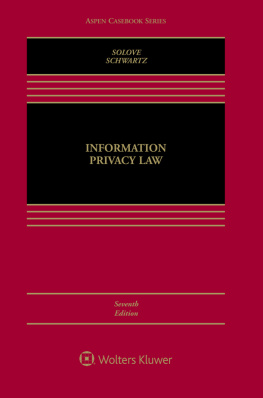
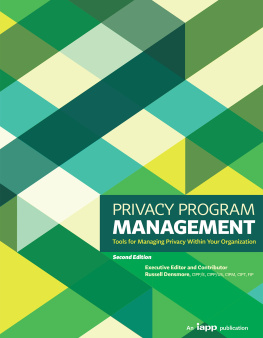
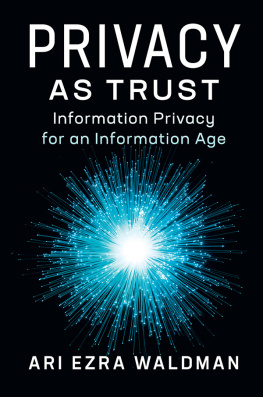
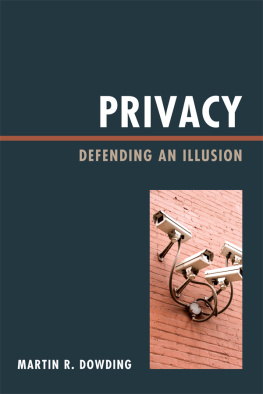
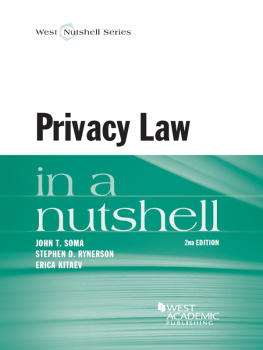
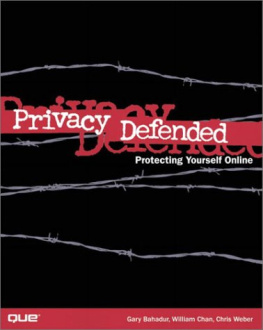
 TM The paper used in this publication meets the minimum requirements of American National Standard for Information Sciences Permanence of Paper for Printed Library Materials, ANSI/NISO Z39.48-1992.
TM The paper used in this publication meets the minimum requirements of American National Standard for Information Sciences Permanence of Paper for Printed Library Materials, ANSI/NISO Z39.48-1992.